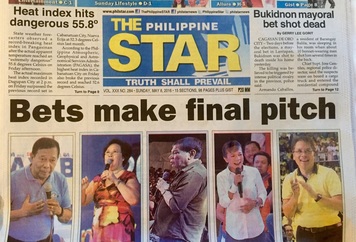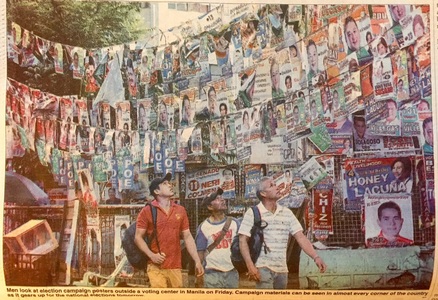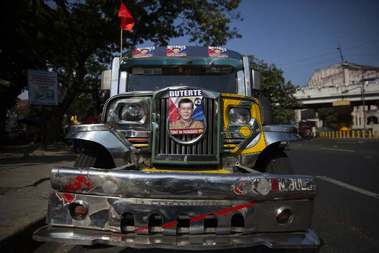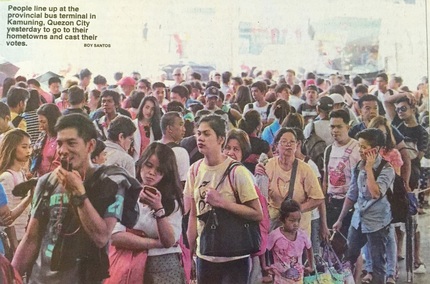
Only one day before Filipinos flock to the polls to vote for their next president and other leaders on Monday, May 9, the campaigning has included rock concerts, backroom dealings and shocking plot lines you’d expect on a soap opera, assassinations and bloodshed, and even the rare political debate.
But no matter who wins tomorrow when the polls close for this country of 100 million living on more than 7,000 islands, the Filipino elections certainly haven’t been boring. I wanted to highlight a few facts and observations about elections in the Philippines; especially since the U.S. election season is getting red hot!
To my Filipino friends, I do apologize if I got some of these details wrong, and I appreciate you clarifying or correcting me!
1. The president serves a 6-year term here and can only be elected to office without re-election.
2. Elections are always held the second Monday of May, and the winner takes office the following June 30.
3. They call political candidates “Bets,” though I can’t find out - why other than speculate it’s because Filipinos love gambling and the presidential race often resembles a cockfight!
4. The current presidential election started with a record 130 Bets in 2015! But now we’re down to only 5 Bets: current Vice President Jejomar Binay, Senator Miriam Defensor-Santiago, Davao City Mayor Rodrigo Duterte, Senator Grace Poe (adopted daughter of a famous Philippines movie star), and Manuel Roxas II
5. But when a president’s term is up, power is not automatically handed over. In fact, if the current president, President Benigno Aquino III, steps down peacefully after a new head of state is elected tomorrow (he’s expected to), it would be the first time since 1998 that power has transitioned smoothly or without a coup.

7. Women play a large part in Philippines politics and operate on equal footing as men. In fact, two of the five remaining presidential candidates are women, Miriam Defensor-Santiago and Grace Poe.
8. Corazon C. Aquino was the first female president of the Philippines in 1986, and Gloria Macapagal-Arroyo served as president from 2001 to 2010.
9. Filipinos living and working abroad make up a huge and influential part of the constituency. There are approximately 2.3 million Filipino citizens working or living abroad in places like the U.S., Japan, Germany, Dubai, etc. – bringing in 1/10th of the country’s GDP. About 500,000 additional Filipino men and women work at sea around the world, on commercial vessels, maritime fleets, and huge numbers in the U.S. Navy.
10. The leading candidate to be the next president is Rodrigo Duterte, former mayor of the city of Davao in the southern island group of Mindanao in the Philippines. He’s currently leading the polls with more than 32% voter support, compared to the next leading candidate, Senator Poe, at 24%,
11. Duterte is nicknamed “The Punisher” for his tight fisted control as mayor of Davao, cleaning up crime, political corruption, and making it one of the safest cities in the world.
12. While admirable and totally atypical here in the Philippines, he’s also fallen under criticism for his totalitarian policies, and there are even allegations of police or military as unsanctioned enforcers or even Death Squads operating outside the rule of law under his reign.
13. In fact, the Davao strongman mayor has been condemned by Amnesty International for human rights violations, including an investigation of 700 suspicious deaths.
14. If elected, Duterte he would be the first ever president from Mindanao – important because it’s far from the stale political establishment in the capital, Manila.
15. But of course in perfect irony, the anti-corruption candidate has been recently immersed in scandal, accused of not declaring a mere $51 million in assets held in a joint bank account with his daughter when filled out his financial and asset disclosures in 2014. (Oops.)
16. But those charges, leveled by a rival Senator running for Vice President, have to be taken with a grain of salt, not because they are probably untrue, but that Filipino politics seems like a constant volley of corruption and embezzlement charges between candidates. If history is any guide, they are probably all correct, so at least it’s a level playing field.
17. Remarkably, Duterte is somehow a combination of Donald Trump and Bernie Sanders:
18. He’s capitalized on the average citizen’s discontent over the political system that is big on corruption, graft, and cronyism but does little to help the large number of poor people, improve infrastructure, or do much to improve the country. But critics point out to the fact that he has no national political experience, and being a dictatorial mayor of a city is far different than running a whole country.

20. But he’s also a political outsider – which is attractive to many people in the country who want to shake things up and take power from the "trapos"—short for “traditional politicians.” They see a small number of wealthy and ultra-powerful families gaining all the power, influence, and riches in the country over and over, no matter who has been president. (Sound a little like the U.S., Bush and Clinton families?)
21. While Duterte’s unapologetic personality has gained him popular support in certain regions, he also has plenty of enemies. Just like Trump, he’s not even unilaterally supported in his own party, and there have been calls for two of the other presidential candidates, Manuel Roxas and Sen. Grace Poe, to somehow unify their campaigns, with one of them dropping out and lending their support to the other in a sacrificial move to block a Duterte win.
22. Duterte is also Trump-esque with his propensity for divisive, inflammatory, and shockingly misogynistic speech. During a speech he once “joked” that he “should have been first” in the 1989 gang rape of an Australian missionary. Duterte called his own daughter “a drama queen” when she came out with the admission that she had been raped, and he said he’d “kill” his own children if they ever used drugs. He’s such a mirror image of Trump that he’s even bragged about his penis in public meetings with business leaders.
23. I’ve been extremely impressed how politically active and dedicated the average person is here. Despite the widespread corruption and poverty, it’s obvious they still see the process of choosing their next leader as a great privilege; maybe because Filipinos were constitutionally guaranteed the right to vote in 1981. The whole country literally stops during the election and many people return to their far-off home provinces to vote in their local elections, with bus stations, highways, airports, and boat stations brimming with people.
24. Most places in the country stop selling and serving alcohol for 24-48 hours around the election as an attempt to curb rioting and political violence, a common policy in most developing countries I’ve visited.
25. There are political posters and advertisements EVERYWHERE, as if a victory is not assured for the candidate who wins the most votes, but who can plaster their likeness the most times on every available surface.
26. These signs are so prevalent that the local joke is if a Filipino stands still during the election season, they’re likely to get covered by political posters. The ads on every wall, light pole, tree, car, building, and house aren’t just for the presidential race but for senators, mayors, vice-mayors, assemblymen, and ever political seat imaginable down to the smallest Barangay (neighborhood), resulting in 4/5 of the country covered in political ads.
27. If that’s not colorful enough, they have trucks rolling through the streets blaring political messages (in between pop songs) at ear-splitting levels, rock concerts to promote candidates, TV, movie, and singing stars lending their support to candidates, and plenty of parades and other public gatherings. Basically, everything BUT talk about actual politics to gain votes!

29. In fact, 145 people were killed by politically related violence in the previous election three years alone. Assassination attempts are such a regular part of politics in the Philippines that it’s common knowledge that $450 is the going rate to arrange for a motorcycle drive-by shooting.
30. The current state of violence in politics is still relatively mild compared to Philippines history, including when renegade soldiers took over Manila’s five-star Peninsula Hotel in 2007 in a post-election coup attempt, broken up with the help of a government tank that rolled right into the hotel lobby.
31. Boxing superstar and national son Manny Pacquiao is running for a Senate seat after dabbing in politics as a two-term Congressman (one which he won unopposed.) He is leading in the polls despite the fact that he apparently did little work or even attended regular policy sessions when he in office.
32. Pacquiao’s appointment to the Senate is likely, but not at all guaranteed after he went on record with ugly anti-homosexual statements, saying they were “worse than animals.” Those remarks led to a 10-point dip in the polls and also being dropped by sponsor Nike.
33. Some of the dirty campaign tactics have including releasing fake psychiatric reports about candidates, attacking family members, questioning the validity of Filipino citizenship (Ted Cruz?) and even having children repeat filthy and curse-laden political diatribes by Duterte in TV ads.
34. While these loud mobile campaign stations (nicknamed “wang-wang”) on trucks are ubiquitous in the city streets, they are not legal. In fact, President Aquino instituted a “No wang-wang” policy (Presidential Decree No. 96) that regulates the use of sirens, bells, whistles, horns and other similar devices only to motor vehicles.
35. He wasn’t necessarily trying to outlaw the ear-splitting noise pollution, but didn’t want these vehicles to add to the already standstill Manila traffic. According to the decree, violators can have their “wang-wang” vehicles confiscated.
-Norm :-)
 RSS Feed
RSS Feed